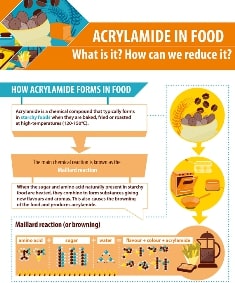Bylaws in the field of reducing of the presence of acrylamide in food, which will enable the harmonization of national legislation with the Union acquis in this area were drafted with the support of the PLAC III project and presented at a of workshop held on 26 April 2021.
The project provided support to the competent Ministry of Agriculture in preparations for the implementation of harmonised legislation which is in line with the Union acquis related to the reduction of acrylamide as a chemically harmful and potentially carcinogenic substance in food. This area falls within the scope of negotiation chapter 12. The workshop was held as the final part of the project support. It was attended by representatives of the Ministry of Agriculture, Water Management and Forestry, inspection services of the Ministry of Health, the Serbian Chamber of Commerce (SCC), the National Alliance for Local Economic Development (NALED) and representatives of the food industry.
Project expert Raymond O’Rourke presented the current EU directives, as well as how the legislation on acrylamide was developed in the Union. Acrylamide is most often found in potato products, cereals, toast and other starch-rich foods that are processed by frying and baking. The basic approach of the legislation is the application of measures to reduce the acrylamide levels in food, with the recommended reference values that producers and food business operators should strive to achieve.
The PLAC III project worked on the transposition of Regulation 2158/2017 on acrylamide and Regulation 315/93 on food contaminants. The Regulation on acrylamide has been transposed through the Rulebook on the maximum concentrations of contaminants in certain food, and it covers all types of food except those for children, babies and special types of food. We have decided to put four articles related to acrylamide in the rulebook that refers to special types of food, O’Rourke said.
The representative of the Ministry of Health, Mirjana Veljković, said that the drafting of the rulebook for special types of food is in progress and that it will contain proposals made by the PLAC project. PKS representative Saška Biorčević said that the Chamber has prepared a guide on acrylamide, which contains relevant EU legislation so that businessmen can keep up with the regulations.
Project expert Jelena Vračar Filipović presented the draft Procedures for official controls of food with a risk for the production of acrylamide, as well as the draft Implementation guide for food business operators. The guide applies to all food operators, from production to retail. The guide also includes the translated brochure of the European Food and Drink Organisation as a good and detailed review of acrylamide, she said.




